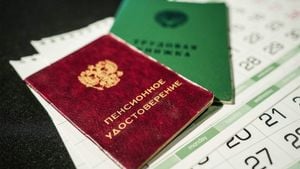Germany's federal elections held on February 23, 2025, have produced unprecedented results, marking a significant shift in the country's political scenery. With record voter turnout at 84%, the Christian Democratic Union (CDU), led by Friedrich Merz, emerged victorious. This election marked the CDU's return to power, necessitating complex coalition talks, particularly with the Social Democratic Party (SPD), which has seen its worst results since World War II.
The CDU garnered approximately 28.6% of the votes, securing around 208 seats. This outcome positions Merz as the next chancellor, though he will likely rely on partnerships to govern effectively. Notably, the far-right Alternative for Germany (AfD) party achieved remarkable results, doubling its support to nearly 20.5%, securing about 150 seats and establishing itself as the second-largest party.
The SPD, once the dominant left-wing party under outgoing Chancellor Olaf Scholz, plummeted to 16.5%, resulting in around 121 seats—a substantial decline attributed to public discontent with their governance. Scholz publicly acknowledged the party's failures, stating, "This is a painful defeat," and took responsibility for the results during discussions with party members.
Friedrich Merz, in his first public comments following the election, declared, "The next chancellor will be Friedrich Merz," expressing gratitude to his party's supporters and emphasizing the importance of forming a stable government. He has ruled out any coalition with the AfD party, stating firmly, "I have never considered working with AfD." This decision stems from the CDU's commitment to maintain historical barriers against far-right movements.
Meanwhile, Alice Weidel, leader of the AfD, expressed confidence after securing historic electoral gains: "We are open to negotiating with the CDU." Her party's surge reflects wider societal shifts and dissatisfaction with traditional parties, particularly over issues like immigration and economic management, which many voters feel have been inadequately addressed.
Looking at the coalition possibilities, if the CDU plans to form a government, they must seek allies among the SPD or the Greens, especially after the Free Democratic Party (FDP) failed to surpass the 5% threshold for representation, losing all parliamentary seats.
The aftermath of the elections sends tremors through Germany's political framework, with analysts predicting heated negotiations between parties as they navigate governance. The CDU-Social Democrat partnership, known traditionally as the "grand coalition," has seen various attempts but has often resulted from political stalemates in earlier governments.
International reactions to this electoral outcome underscored the global stakes at play. Israeli Prime Minister Benjamin Netanyahu congratulated Merz on his victory, expressing eagerness for cooperation between Germany and Israel. Similarly, NATO Chief Mark Rutte emphasized the importance of Europe's defense strategies, hinting at pending shifts in foreign policy following Germany's election.
Political analysts acknowledge the pivotal role of this election not just for Germany, but for Europe's broader political dynamics, particularly as nationalism and populism reshape the continent's systems. The ascendency of the AfD signals new challenges for left-leaning parties, which must adapt to the changing electorate.
Reflecting on the trends from the election, this year marks not only the rise of conservative politics but signifies the urgent need for traditional parties to reassess their platforms and respond to the public's changing priorities. The path forward for the CDU will not only be about governance but also about addressing the discontent and aspirations of voters who have turned away from traditional political structures.
Overall, this electoral outcome is anticipated to reshape the German political scene. Movements toward the right, particularly through the AfD, signify potential long-term changes and challenges for established parties, raising questions about the future of coalitions, governance strategies, and Germany's political identity within Europe.



